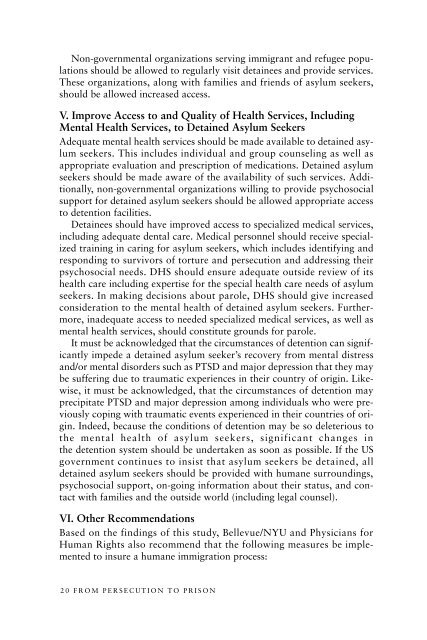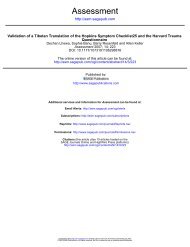From Persecution to Prison - Bellevue/NYU Program for Survivors of ...
From Persecution to Prison - Bellevue/NYU Program for Survivors of ...
From Persecution to Prison - Bellevue/NYU Program for Survivors of ...
You also want an ePaper? Increase the reach of your titles
YUMPU automatically turns print PDFs into web optimized ePapers that Google loves.
Non-governmental organizations serving immigrant and refugee populationsshould be allowed <strong>to</strong> regularly visit detainees and provide services.These organizations, along with families and friends <strong>of</strong> asylum seekers,should be allowed increased access.V. Improve Access <strong>to</strong> and Quality <strong>of</strong> Health Services, IncludingMental Health Services, <strong>to</strong> Detained Asylum SeekersAdequate mental health services should be made available <strong>to</strong> detained asylumseekers. This includes individual and group counseling as well asappropriate evaluation and prescription <strong>of</strong> medications. Detained asylumseekers should be made aware <strong>of</strong> the availability <strong>of</strong> such services. Additionally,non-governmental organizations willing <strong>to</strong> provide psychosocialsupport <strong>for</strong> detained asylum seekers should be allowed appropriate access<strong>to</strong> detention facilities.Detainees should have improved access <strong>to</strong> specialized medical services,including adequate dental care. Medical personnel should receive specializedtraining in caring <strong>for</strong> asylum seekers, which includes identifying andresponding <strong>to</strong> survivors <strong>of</strong> <strong>to</strong>rture and persecution and addressing theirpsychosocial needs. DHS should ensure adequate outside review <strong>of</strong> itshealth care including expertise <strong>for</strong> the special health care needs <strong>of</strong> asylumseekers. In making decisions about parole, DHS should give increasedconsideration <strong>to</strong> the mental health <strong>of</strong> detained asylum seekers. Furthermore,inadequate access <strong>to</strong> needed specialized medical services, as well asmental health services, should constitute grounds <strong>for</strong> parole.It must be acknowledged that the circumstances <strong>of</strong> detention can significantlyimpede a detained asylum seeker’s recovery from mental distressand/or mental disorders such as PTSD and major depression that they maybe suffering due <strong>to</strong> traumatic experiences in their country <strong>of</strong> origin. Likewise,it must be acknowledged, that the circumstances <strong>of</strong> detention mayprecipitate PTSD and major depression among individuals who were previouslycoping with traumatic events experienced in their countries <strong>of</strong> origin.Indeed, because the conditions <strong>of</strong> detention may be so deleterious <strong>to</strong>the mental health <strong>of</strong> asylum seekers, significant changes inthe detention system should be undertaken as soon as possible. If the USgovernment continues <strong>to</strong> insist that asylum seekers be detained, alldetained asylum seekers should be provided with humane surroundings,psychosocial support, on-going in<strong>for</strong>mation about their status, and contactwith families and the outside world (including legal counsel).VI. Other RecommendationsBased on the findings <strong>of</strong> this study, <strong>Bellevue</strong>/<strong>NYU</strong> and Physicians <strong>for</strong>Human Rights also recommend that the following measures be implemented<strong>to</strong> insure a humane immigration process:20 FROM PERSECUTION TO PRISON



